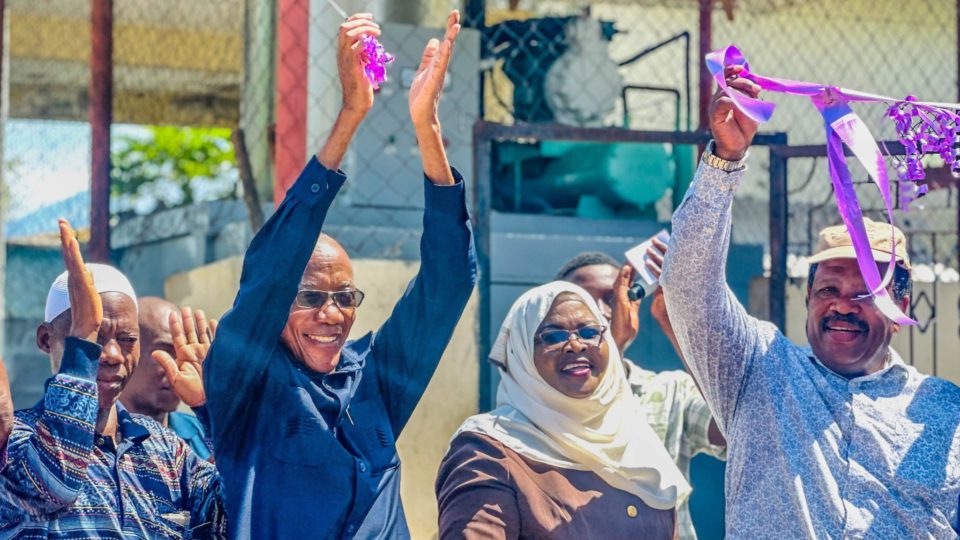Fisheries is one of Tanzania’s key economic sectors. In 2022, the fishing industry contributed 1.8 per cent to the National GDP and grew by 2.5 per cent. With approximately 4.5 million Tanzanians engaged, this sector not only contributes to household incomes but also plays a key role in enhancing food security and nutrition.
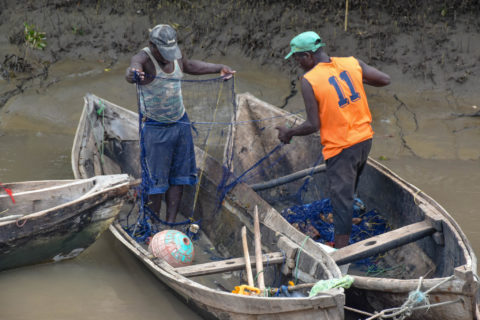
Fishermen at Simba Ulanga in Rufiji delta
Like in many African countries, fishing in Tanzania is mainly artisanal and conducted in natural waters, accounting for about 95 per cent of all the national catch. Until April 2023, fishermen harvested 426,555.46 tonnes of fish worth 2.86 trillion Tanzanian shillings (US$ 1.211 billion).
Aligned with Tanzania’s blue economy development objectives and the National 5-Year Development Plan (FYDP III 2021/22 – 2025/26, which prioritises fisheries and aquaculture), Wetlands International collaborated with the Kibiti District Council and Tanzania Electrical Mechanical and Electronics Service agency (TEMESA) to rehabilitate the 10-tonne cold storage plant in Rufiji delta. The facility’s rehabilitation was made possible through the Mangrove Capital Africa programme that is funded by DOB Ecology.
Located in Nyamisati, the facility broke down in 2021 forcing the fishing community to resort to traditional methods to preserve their catch, particularly smoking where fuel wood from mangroves is preferred.
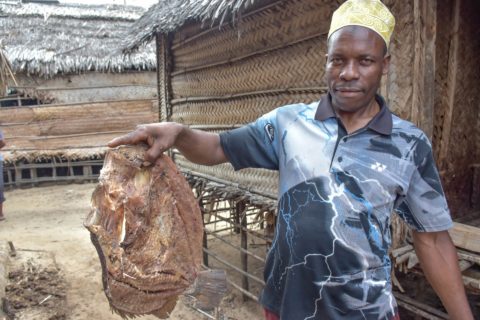
Mustafa Masudd shows off his smoked fish at Simba Ulanga in Rufiji delta
Born in Nyamisati, Mustafa Mohamed Masudd has been a fisherman and trader at Simba Ulanga since 1990. “We normally use wood fuel and salt to preserve our fish. Fish preserved by fire usually lasts eight days without going bad; with salt, three months. We prefer mangrove fuel wood as it has more intense heat than terrestrial wood.”
During the handover event where Kibiti District Commissioner Col. Joseph Kolombo was chief guest, Wetlands International Tanzania Board Chair John Salehe officially emphasised the importance of stakeholder interventions aligning with district development plans for sustainability.
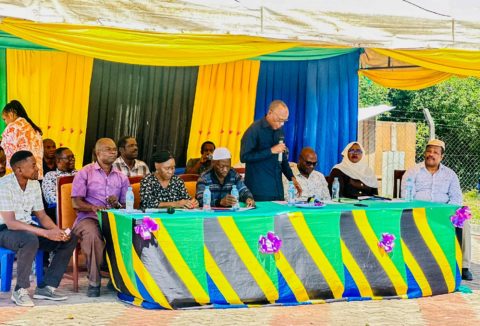
Kibiti DC Col. Kolombo underscores the role of the rehabilitated cold storage facility to fishermen in the Rufiji delta
“Wetlands International is not just handing over this plant; its rehabilitation has been through collaborative action. Rather, we are boldly stating that the operations that were being undertaken pre-2021 can now continue. And that is for the fishing communities and fisheries stakeholders to increase productivity, reduce losses, uplift livelihoods and boost revenue also for the government,” stated Salehe.
Kibiti District Commissioner Col. Joseph Kolombo lauded the impact of the cold storage plant on the predominantly artisanal fishing community in Rufiji delta, citing a significant high yield of 13.55 kg per boat. “This cold storage plant heralds a great change and joy for the community and marine resources stakeholders. When it broke down, the fishermen and fish traders suffered huge losses due to spoilage and selling their catch at low prices. That will now be history.
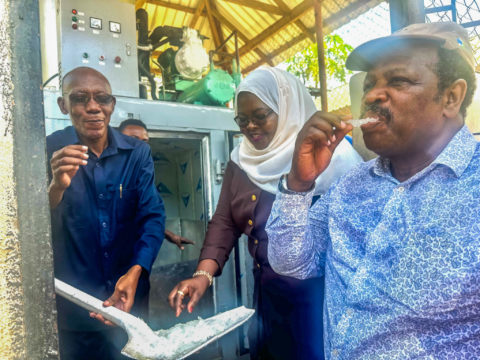
Tasting the ice! Verifying that the cold storage facility at Nyamisati in Rufiji delta is in working condition
“Our partners, Wetlands International, should know that their efforts to create sustainable and alternative livelihood activities for these communities, and the conservation and restoration of the mangroves is highly appreciated by the Government led by the Honorable President Samia Suluhu Hassan.”
TEMESA Manager Eng. Rehana Juma Yahaya provided recommendations for sustainable plant operations, including the development of a business plan and revenue collection management plan. She emphasised the need for suitable and cost-effective water supply and skilled personnel for optimal plant functionality.
“With this facility operational, we are now confident that our fish catch will not spoil. However, there is a need for regular freshwater supply for the facility to work effectively and efficiently bearing in mind that it will serve fisherfolk in Kibiti and Mafia districts,” stated Hamisa Monero, a fisherman in Nyamisati village.
Wetlands International’s collaborative efforts with the Kibiti District Office extend beyond the cold storage facility and include conserving and restoring mangroves in the Rufiji delta together with Tanzania Forest Services Agency, while also promoting complementary and alternative livelihoods options for the communities.
“This cold storage facility will reduce our costs in fuel wood and salt which are an extra expense. For fishermen and traders, we are keen on our income and if we can decrease any expenses, then that’s development for us,” said Masudd.
The impact of the cold storage facility not only brings economic benefits, but also stands as a testament to the power of innovative solutions in uplifting livelihoods, preserving natural resources, and strengthening communities.
Lead image: Kibiti District Commissioner Col. Joseph Kolombo (second left) flanked by TEMESA’s Eng. Rehana Juma Yahaya and Wetlands International Tanzania Board Chair John Salehe (right) and fisherman Hamisa Monero (extreme left)

